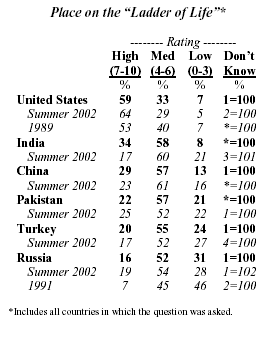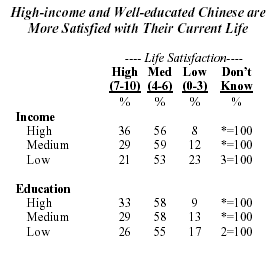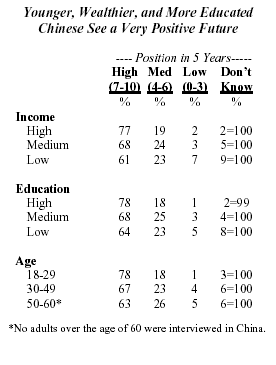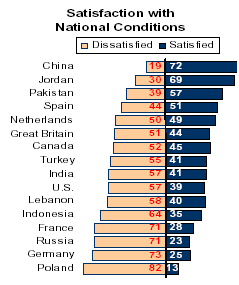Summary of Findings
Since Deng Xiaoping first embraced economic reform in the late 1970s, China’s leaders have coupled continued strict political control with widespread free market reforms that have transformed the Chinese economy and created unprecedented growth. Despite their limited political freedoms, the Chinese people, surveyed in six major cities and surrounding rural areas, are optimistic about the future and confident that the growing opportunities they have experienced in recent years will continue to expand.
China’s upbeat outlook is all the more striking when compared with the prevailing mood in Russia, the other of America’s two principal former communist adversaries. While the Chinese – along with the citizens of India, another Asian giant with a vigorously expanding economy – look to the next five years with a strong sense of optimism, Russians are far less hopeful about their personal lives, and unhappy with the country’s direction.
Climbing the “Ladder of Life”
 A May 2005 poll of Chinese citizens, conducted as part of a 17-country Pew Global Attitudes survey, reveals that while most are still not fully satisfied with their personal advancement, they are cognizant of having made substantial progress in recent years.
A May 2005 poll of Chinese citizens, conducted as part of a 17-country Pew Global Attitudes survey, reveals that while most are still not fully satisfied with their personal advancement, they are cognizant of having made substantial progress in recent years.
When asked to place themselves on a “ladder of life,” where 0 represents the worst possible life and 10 the best possible life, the majority of Chinese surveyed still say they are on the middle steps of the ladder. Only 29% now place themselves in the “high” (7-10) category, somewhat fewer than the 34% of Indians who do so and well behind the nearly six-in-ten Americans who position themselves on the ladder’s top rungs.
But the number of “high” self-raters in China has increased from 23% three years earlier, and only 13% of Chinese now say their lives merit a low (0-3) score. (By contrast, only 16% of Russians place themselves in the high category, while 31% say their current lives merit a low score.)
 Even more striking is the Chinese sense of personal advancement. China has the largest percentage of people (50%) who believe they have made progress in their lives over the last five years, up from 42% who said so in 2002.
Even more striking is the Chinese sense of personal advancement. China has the largest percentage of people (50%) who believe they have made progress in their lives over the last five years, up from 42% who said so in 2002.
In this regard, the Chinese outpace even Americans, among whom 47% report personal progress, and far outpace Russians, only 38% of whom feel they have gained ground in recent years.
Still, it is noteworthy that a substantial number of Chinese (31%) believe they have actually lost ground, fully as many as in Russia and more than in India or the United States – a reminder that China’s economic growth has not touched everyone.
Surging Optimism
 China’s outlook toward the future is even rosier. Nearly seven-in-ten (69%) Chinese expect that five years from now they will stand on the top rungs of the ladder of life, an increase of 14 points since 2002. In this respect the Chinese rival Americans whose predominantly sanguine outlook is among their most distinguishing traits. Moreover, merely 4% of Chinese expect to be left behind on the lowest rungs, fewer even than the 7% of Americans who fear this outcome. By contrast, Russians are highly negative in their expectations. Just one-third (34%) of Russians believe they will be in the high category five years from now.
China’s outlook toward the future is even rosier. Nearly seven-in-ten (69%) Chinese expect that five years from now they will stand on the top rungs of the ladder of life, an increase of 14 points since 2002. In this respect the Chinese rival Americans whose predominantly sanguine outlook is among their most distinguishing traits. Moreover, merely 4% of Chinese expect to be left behind on the lowest rungs, fewer even than the 7% of Americans who fear this outcome. By contrast, Russians are highly negative in their expectations. Just one-third (34%) of Russians believe they will be in the high category five years from now.
On the other hand, India is even more hopeful than China. Among Indians, fully 75% believe their lives will rate a 7-10 score in five years, up a remarkable 33 points since Pew’s 2002 survey. This is in sharp contrast to India’s neighbor and rival, Pakistan. Three years ago, Pakistanis were slightly more optimistic than Indians; today, Indians are more than twice as likely as their Pakistani neighbors to predict their lives will merit a 7-10 rating five years hence.
 Indeed, China emerges as the world leader in hope for the future on a composite index of optimism. The index — calculated by subtracting a respondent’s current position on the ladder of life from his/her expected position five years from now — reveals that more than three-in-four (76%) Chinese expect their personal position to improve over the next five years.
Indeed, China emerges as the world leader in hope for the future on a composite index of optimism. The index — calculated by subtracting a respondent’s current position on the ladder of life from his/her expected position five years from now — reveals that more than three-in-four (76%) Chinese expect their personal position to improve over the next five years.
While that proportion is not significantly different from the 75% of Indians who share that view, it is far higher than the optimism registered in America. Slightly fewer than half of Americans (48%) expect to enjoy personal progress, the same number as in Turkey, and scarcely more than the 45% in gloomy Russia — of course, on average, Americans start at a far higher level of satisfaction.
Who’s Happiest?
Perhaps not surprisingly, life satisfaction is associated with socioeconomic status. The well-educated and those with higher incomes — precisely the groups best equipped to confront the social and economic upheaval of globalization — tend to rate their lives more positively. China is no exception.
 As in the six other countries surveyed on this point, optimism about the future in China is also higher among the wealthier and better-educated. Among those currently in the top income category, 77% predict that they will be on the top rungs of the life ladder five year hence, compared with a still high 61% in the lowest income group. Similarly, 78% of those with the highest levels of education predict a rosy future for themselves.
As in the six other countries surveyed on this point, optimism about the future in China is also higher among the wealthier and better-educated. Among those currently in the top income category, 77% predict that they will be on the top rungs of the life ladder five year hence, compared with a still high 61% in the lowest income group. Similarly, 78% of those with the highest levels of education predict a rosy future for themselves.
Also, as in the other countries where these questions were asked, high expectations about personal progress are more common among young people. (Even in downbeat Russia, 59% of 18-29 year-olds believe they will be in the high category five years from now).
 In the category of youthful optimism, however, the U.S. still outranks China, with 87% of Americans under age 30 confident that they will have climbed far up life’s ladder of possibility come 2010. Only in the over-50 age category do the Chinese exceed Americans’ personal expectations for the next five years.
In the category of youthful optimism, however, the U.S. still outranks China, with 87% of Americans under age 30 confident that they will have climbed far up life’s ladder of possibility come 2010. Only in the over-50 age category do the Chinese exceed Americans’ personal expectations for the next five years.
Feeling Good About Their Country Too
The personally upbeat attitude and self-confidence reported by the Chinese people is further reflected in the numbers who feel that their country is well-liked in the world. Nearly 7-in-10 Chinese (68%) say that other countries think positively about China — a far cry from the mere 26% of Americans who think the U.S. is generally liked in the world. Meanwhile, only 42% of the Chinese have a favorable view of the United States, far fewer than the 71% of Indians who view the U.S. favorably. However, more than half of Chinese (53%) do say that America takes the interests of countries like China into account in its foreign policy decisions.
 Most strikingly, China heads the list of countries that are, on balance, satisfied with the way things are going at home. More than seven-in-ten Chinese citizens (72%) express satisfaction with their national condition, while fewer than one-in-five (19%) are dissatisfied. These figures represent a sharp improvement from 2002, when only 48% said they were satisfied with their country while 33% were not. On this score, China far outstrips India, where only 41% say they are content with national conditions. And in China, the level of satisfaction is more than three times higher than in Russia, where only 23% are pleased with their country’s direction.
Most strikingly, China heads the list of countries that are, on balance, satisfied with the way things are going at home. More than seven-in-ten Chinese citizens (72%) express satisfaction with their national condition, while fewer than one-in-five (19%) are dissatisfied. These figures represent a sharp improvement from 2002, when only 48% said they were satisfied with their country while 33% were not. On this score, China far outstrips India, where only 41% say they are content with national conditions. And in China, the level of satisfaction is more than three times higher than in Russia, where only 23% are pleased with their country’s direction.
In short, China’s citizens, unlike those in Russia but much like those in India, are clearly upbeat about the growing opportunities in their rapidly modernizing society. Business Week recently noted that China’s economy has expanded by 9.5% a year over the last two decades. The Chinese appear confident that these gains will continue and that they will feel the effects of continued growth in their own lives.


